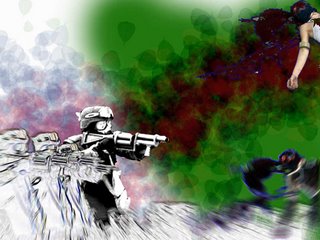Rebel dignity
There are those who will never be crushed. There are those who even dead continue fighting. There are those who cease to be human and become an idea, a concept, a revolution. There are those whose names are forgotten but whose actions linger on.
In southern Mexico over fifteen years ago there was a group of men and women that congregated. They remembered. They remembered that they had not always been oppressed; they remembered when there had been a time when their people had lived in dignity. It was this memory that animated them, that directed their movement at the beginnings. They were indigenous man and women who had remembered this. Then they remembered that once they had fought. They had fought oppression like the one they were living now. They remembered that they had fought the Spanish conquerors. They remembered that their forefathers had stood up and fought. They also remembered that again they had fought the continuers of the conquistador tradition in Mexico, many years after. They remembered that man that had stood out amongst so many heroes: Emiliano Zapata, who had shouted out: “Land and Liberty!” He was long dead, but his memory remained and it was these memories that united these shadows that collected in the dusty and disused corners of the Mexican South. It was these memories that, like a magnet brought these people together in the darkness. The anger had been breeding for a long a time. Now it crystallized into a thought, an organisation an aim.
For a time they stayed in the dark of the forest, forgotten, pushed aside by the government. But in cool darkness of the undergrowth they planned, they plotted. Silently they moved from township to Run-down Township. They spoke to the men and women there. They organised. They thought. They formulated plans. And they came to the conclusion that they would need to fight. The anger was too great. The unhearing ears of the government too deaf. And so they gathered support. Hundreds, and soon thousands drifted towards this group that now had a plan, an aim and a name. The Zapatista Army for National Liberation. Thousands of Zapatistas infiltrated the corrupt police in Chiapas. On New Years Eve they volunteered to take a shift no one else wanted. On January the First 1994 the insurrection occurred. Almost as if in dream the police stations were seized and the army gained control of large swathes of the state.
BY now the anger of the indigenous Mexicans had a face and a name. The army marched on the capital, Mexico. At first it seemed like a conventional army, invading a land it had no right to hold. But the Zapatistas had a weapon the conquering armies of Spain, France and corrupt capitalist imperialism had never had. They had the weight of memory. They used as a great club, smashing the threatening vision of hundreds of masked men marching across the country. For as they took town after village after town they allowed the people there to refuse and fight their rule. They allowed the towns to rule themselves. They did not conquer. The liberated in a way no army has ever done. As the fire spread across Mexico sparks flew off in the winds of change and settled around the globe starting fires, small or large, in the USA, Europe, Africa, South America and Asia. These fires were never to go out, even as the Zapatistas were crushed by the armies of corruption, by the American backed Mexican troops. As entire villages were destroyed by the advancing tanks, around the world the flames of dissent were already burning. The flames have never gone out. They have grown stronger even as the Zapatistas were pushed back into the Jungles of Chiapas, Mexico. The fires blazed in Genoa. The fires blazed in Nairobi. The fires blazed in Paris. The fires Blazed in Washington. The fires Blazed in Seattle. And the fires blaze on, constantly stoked by change, and fuelled by revolt, anger and discontent. The sparks were not lost. They found try tinder around the globe that was ready to go up. The Zapatistas started a fire that now reaches across the globe. A fire of red flames. A fire who sounds like hope. A fire that creates even as it destroys.
A fire that will not be put out now it has started.
By RzBz
Exclusive to Ritoer's Blog so make the most of it!!


